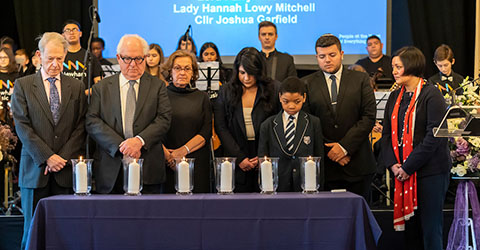
Holocaust survivor John Hajdu MBE joined Mayor of Newham Rokhsana Fiaz today (27 January) in a moving ceremony to remember the victims of Nazi persecution and subsequent genocides across the world.
The ceremony was part of Newham Council’s annual event to mark Holocaust Memorial Day, which this year marked the 75th anniversary of the liberation of the Auschwitz-Birkenau concentration camp in Poland where indescribable atrocities were committed.
More than 400 people, mainly schoolchildren, gathered at the Old Town Hall in Stratford to reflect on why people must draw on the lessons to be learned from history and today and stand together to stop the spread of hatred.
Mr Hajdu, 82, survived the Nazi persecution of Hungarian Jews during the Second World War, followed by Soviet oppression after liberation. In 1956 he fled from Budapest, arriving in this country a year later.
He told the audience, which included Deputy Lieutenant John Barber, The Queen’s representative in Newham, how his father had been sent to a forced labour camp and his mother to a concentration camp in Austria where she was regularly beaten. He and his mother were reunited after the war.
Mr Hajdu said: “It is possible to learn through the power of words what I and thousands of others went through and that present and future generations must remember those dark days and shout never again. We just have to keep on talking about it.”
Mayor Rokhsana Fiaz said: “We must never forget those who lost their lives in the Holocaust which was driven by hatred and Nazi persecution, and also in the genocides since in Cambodia, Rwanda, Bosnia, Darfur and others.
“Remembering reminds us about everything we value about living in Newham. It’s more important than ever now that we treasure our glorious diversity as a source of strength. Every single person needs to know that they belong here. And when we remember we also think about the people who spoke out against persecution, those who offered shelter and protection, and those who resisted murderous regimes. These acts of love and resistance are at the heart of this year’s Holocaust Memorial Day theme of standing together.”
Newham’s commemoration began with Britannia Village School choir performing No Wars Will Stop Us Singing and there were readings from pupils at St Joachim’s, Earlham, Essex and St Helen’s primary schools and Royal Docks Academy.
There was moving testimony from Bosnia genocide survivor Arnesa Buljusmic-Kustura who spoke of the importance of remembering the horrors and lessons of genocide not just today but always, to make sure they don’t happen again. This year is the 25th anniversary of the genocide in Bosnia.
Music also came from cello player Tyrone Musngi, 13, from Newham Music Hub, who performed Gabriel Faure’s Elegie and Newham Music’s Bridging Sounds Orchestra who performed the theme from Schindler’s List, the film about German industrialist Oskar Schindler who tried to save Jewish employees. Star primary school choir performed Lean on Me by Bill Withers.
Other speakers were Lady Hannah Lowy Mitchell, a documentary maker and emeritus trustee for Women for Women International and chair of the Lowy Mitchell Foundation, and Lord Parry Mitchell, who chaired the Coexistence Trust, which encouraged dialogue between Jewish and Muslim students on UK university campuses.
Six candles were lit in memory of the six million who lost their lives during the Holocaust and other genocides. The lighting ceremony was performed by John Hajdu, Arnesa Buljusmic-Kustura, Tyrone Musngi, Lord Mitchell and Lady Lowy Mitchell, and Newham councillor Josh Garfield.
The Mayor concluded: “We still bear witness to atrocities occurring across the world. We still see the rise of anti-semitism and we still see hate in new forms impacting more and more lives in different ways. That’s why we must stand together and take action to stop the spread of hatred in our communities and draw on the lessons we learn from history and today.”
